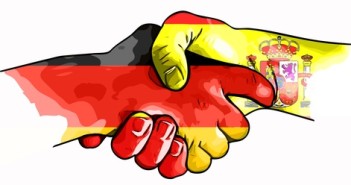The danger of a breakup of the euro-zone has pushed Germany to a verbal intervention, pledging to do “anything†to save the euro. The president of the ECB, Mario Draghi, first used these strong words. Germany repeated them in two statements: the first was together with the French, while the second was with the Italians.
It is still to be seen what Germany and the ECB are really willing to do. However, despite the eroding of the euro’s popularity in the German public, the euro-zone’s locomotive has very good reasons to take some losses for the sake of the common currency.
The value of the euro, even at its strongest days, would have been significantly weaker than the old Deutschmark. Germany enjoys a weaker currency as it helps its export machine. The country has less competition from countries within the euro-zone, that would have otherwise had a weaker currency. It also has an advantage over external competitors thanks to the euro.
This was acknowledged by the German Council of Experts, also known as the “Wise Men†or Fünf Wirtschaftsweisen in German. They see a loss of of no less than 3 trillion euros is a scenario where the European Monetary Union falls apart. Ambrose Evans-Pritchard mentions about this in article discussing other euro-zone issues.
Also a major German company fears this scenario: Michael Heise, the chief economist of the German insurance giant Allianz also sees an appreciation of 15-20% in the D-Mark that would lead to a drop of 5% in GDP within a year.
And this mess will likely continue far longer according to Heise:
Over four or five years after a break-up of the currency union, the German economy is likely to suffer production losses of up to 25%, compared with normal economic development
It’s also important to remember that German institutions are heavily exposed to Spain and Italy. So will Germany take a small loss now to prevent a bigger one afterwards?
They could start by allowing the ECB to launch a full QE program, among other options that the central bank has.
See the ECB preview for all the options for turning a corner in the crisis.



